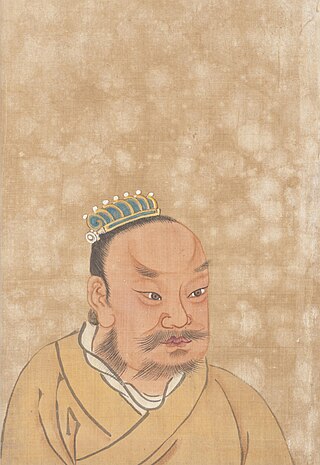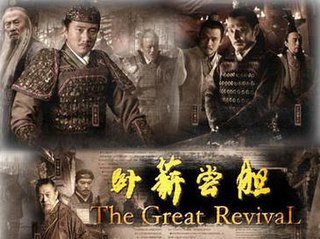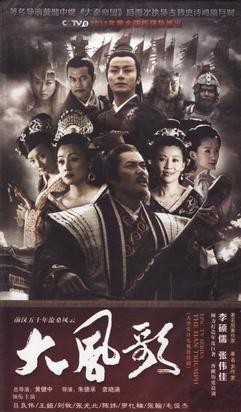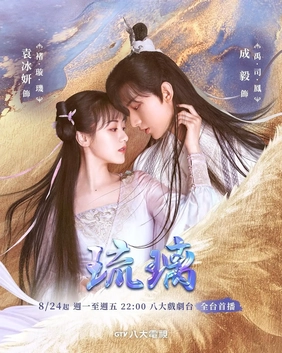Plot
During the reign of Jiajing Emperor of the Ming dynasty, the evil court official Yan Song relies on the emperor favoritism towards him, becoming overbearing and domineering. An honest official Zhang Yinglong impeaches Yan Song with a "Ten Cimes Five Deceits" against him. But instead he gets flogged 30 times, and banished to a far off frontier Guizhou.
Zhang Yinglong's remonstration won the hearts of the common people, on the day of his banishment thousands of people turned out to see him off. At the sight of this, Yan Song knows that if he does not kill off Zhang Yinglong, he will be unable to deter other court officials. Thereupon, he arranges for assassins to kill Zhang Yinglong during the journey.
In Guizhou, between the high mountain ridge lies a small relay station. Because this place is far off and also not deemed an important area by the government, therefore the relay station has become run-down. The relay station is managed by two young people, Shi Yipao and Bu Deliao, and also Zeng Wuliao. Shi Yipao seems like a person who feels that he never gets enough sleep, and has a look of bewilderment on him every day. Bu Deliao and Zeng Wuliao are both are diligent, but they are kind of stupid looking. These three people have already spent six useless years in this boring place.

The Chu–Han Contention (楚漢相爭), also known as the Chu–Han War (楚漢戰爭), was an interregnum period in Imperial China between the fall of the Qin dynasty and the establishment of the Western Han dynasty. After the third and last Qin ruler, Ziying, unconditionally surrendered to rebel forces in 206 BCE, the former Qin Empire was divided by rebel leader Xiang Yu into the Eighteen Kingdoms, which were ruled by various rebel leaders and surrendered Qin generals. A civil war soon broke out, most prominently between two major contending powers – Xiang Yu's Western Chu and Liu Bang's Han. Some of the other kingdoms also waged war among themselves but these were largely insignificant compared to the main conflict between Chu and Han. The war ended in 202 BCE with a Han victory at the Battle of Gaixia, during which Xiang Yu committed suicide after making a last stand. Liu Bang subsequently proclaimed himself emperor and established the Western Han dynasty.

Xiang Ji, courtesy name Yu, was the Hegemon-King of Western Chu during the Chu–Han Contention period of China. A noble of the state of Chu, Xiang Yu rebelled against the Qin dynasty, destroying their last remnants and becoming a powerful warlord. He was granted the title of "Duke of Lu" (魯公) by King Huai II of the restoring Chu state in 208 BC. The following year, he led the Chu forces to victory at the Battle of Julu against the Qin armies led by Zhang Han. After the fall of Qin, Xiang Yu was enthroned as the "Hegemon-King of Western Chu" (西楚霸王) and ruled a vast area covering modern-day central and eastern China, with Pengcheng as his capital. He engaged Liu Bang, the founding emperor of the Han dynasty, in a long struggle for power, known as the Chu–Han Contention, which concluded with his eventual defeat at the Battle of Gaixia and his suicide. Xiang Yu is depicted in the Wu Shuang Pu by Jin Guliang.
Shi Xie (137–226), courtesy name Weiyan, also rendered as Sĩ Nhiếp in Vietnamese, was a Chinese military general, politician, and warlord who lived during the Eastern Han dynasty and early Three Kingdoms period of China. He served as the Administrator of Jiaozhi Commandery in present-day northern Vietnam. The third-century historical text Records of the Three Kingdoms (Sanguozhi) is a major source of Chinese traditions concerning Shi Xie's life. He promoted Buddhism throughout his life. After his death, the Vietnamese attached many legends to him and honoured him as Sĩ Vương in some temples.
Emperor Yi of Chu, also known as King Huai II of Chu before receiving his de jure emperor title, personal name Xiong Xin, was the ruler of the revived Chu state in the late Qin dynasty. He was a grandson of King Huai of Chu. In 223 BC, during the Warring States period, the Chu state was conquered by the Qin state, which unified the various Chinese feudal states in a series of wars and established the Qin dynasty in 221 BC. In 209 BC, when rebellions broke out throughout China to overthrow the Qin dynasty, the Chu state was revived as an insurgent state against Qin imperial rule. Xiong Xin was discovered by Xiang Liang, a rebel leader who descended from a famous Chu general, Xiang Yan, and installed on the Chu throne as "King Huai II of Chu". However, Xiong Xin was a puppet ruler because power was concentrated in Xiang Liang's hands, and while he was able to assert his power after Xiang Liang was killed in battle, eventually Xiang Liang's nephew, Xiang Yu, would concentrate power in his own hands through a coup against King Huai II's general Song Yi during the Battle of Julu. In 206 BC, the Qin dynasty was overthrown by the rebels, after which Xiang Yu, who was the de facto leader of all the rebel forces, divided the former Qin Empire into the Eighteen Kingdoms. He promoted King Huai II to a more "honourable" title – Emperor Yi of Chu – and made him the nominal sovereign ruler over all the Eighteen Kingdoms. Xiang Yu then had Emperor Yi relocated to Chen County and secretly ordered Ying Bu to assassinate the emperor during the journey.

The Water Margin, also known Outlaws of the Marsh and Seven Blows Of The Dragon, is a 1972 Hong Kong film adapted from the Chinese classical 14th-century novel Water Margin. It was produced by the Shaw Brothers Studio and directed by Chang Cheh. Godfrey Ho was assistant director.

Romance of the Three Kingdoms is a Chinese television series adapted from the classical 14th century novel of the same title by Luo Guanzhong. The series was produced by China Central Television (CCTV) and was first aired on the network in 1994. It spanned a total of 84 episodes, each approximately 45 minutes long. One of the most expensive television series produced at the time, the project cost 170 million yuan. It was completed over four years and involved over 400,000 cast and crew members, including divisions of the People's Liberation Army from the Beijing, Nanjing and Chengdu military regions. Some of the dialogue spoken by characters was adapted directly from the novel. Extensive battle scenes, such as the battles of Guandu, Red Cliffs and Xiaoting, were also live-acted.

The Great Revival, also known as Wo Xin Chang Dan, is a Chinese television series based on the conflict between the Yue and Wu states in the Spring and Autumn period. The Chinese title of the series is a Chinese idiom derived from King Goujian of Yue's perseverance in overcoming the odds to revive his fallen state of Yue and conquer the rival state of Wu. The series was first broadcast on CCTV-8 in mainland China in January 2007.

The Story of Han Dynasty is a Chinese television series based on the events in the Chu–Han Contention, an interregnum between the fall of the Qin dynasty and the founding of the Han dynasty in Chinese history. The series was first broadcast on CCTV in China in 2003. Directed by Wei Handao, the series starred Hu Jun, Xiao Rongsheng, Jacklyn Wu, Kristy Yang, Wang Gang and Li Li-chun.

The Water Margin is a 1998 Chinese television series adapted from Shi Nai'an's classical 14th-century novel of the same title. It was produced by CCTV with Zhang Jizhong as producer. It was first broadcast in China in January 1998. The series also featured action choreography by Yuen Woo-ping.

The Book and the Sword is a 2008 Chinese television series adapted from Louis Cha's novel of the same title. The series was first broadcast on CETV-3 in China in 2009. It starred Qiao Zhenyu, Adam Cheng, Niki Chow, and Liu Dekai.

All Men Are Brothers is a 2011 Chinese television series adapted from Shi Nai'an's 14th century novel Water Margin, one of the Four Great Classical Novels of Chinese literature. The series is directed by Kuk Kwok-leung and features cast members from mainland China, Taiwan and Hong Kong. The series was first broadcast on 8TV in March 2011 in Malaysia.

Journey to the West is a Chinese television series adapted from the 16th-century novel of the same title. The series was directed and produced by Cheng Lidong and starred Zhenxiang, Victor Chen, Xie Ning and Mou Fengbin in the leading roles. It was first aired on Zhejiang Satellite TV (ZJSTV) in China on 14 February 2010. This version is not to be confused with the 2011 television series of the same title produced by Zhang Jizhong.

The Patriot Yue Fei is a 2013 Chinese television series based on the life of Yue Fei, a Song dynasty general widely regarded as a patriot and national hero in Chinese culture for his role in defending the Song empire against the Jurchen campaigns. While the plot is based on historical sources, it also includes elements of fiction and draws ideas from the novel General Yue Fei (說岳全傳) and other folktales on the general's life.

The Han Triumph, also known as Wind Ode, is a Chinese television series based on historical events in the early Han dynasty, beginning with the founding of the dynasty by Liu Bang after his triumph over Xiang Yu, and the events leading to the reign of Liu Heng. Directed by Huang Jianzhong, the series starred Ray Lui, Wang Ji, Liu Mu, Zhang Guangbei, Chen Wei and Li Qingxiang in the leading roles. It was first broadcast on CCTV-8 in China on 17 December 2011.

Singing All Along is a 2016 Chinese television series produced by Ruby Lin, starring Lin and Yuan Hong. Set in 1st-century imperial China, the drama is based on Li Xin's (李歆) 2007–2009 romantic novel series Xiuli Jiangshan (秀丽江山) and focuses on the relationship between Liu Xiu, a peasant-turned-Eastern Han dynasty founder, and Yin Lihua, the love of his life. Although the original novel involved time travel, the television series does not contain those parts.

Su Dongpo is a 2012 Chinese historical TV series produced by China Central Television. It was first shown in 2012, although it was filmed in 2007.
Court Lady is a 2021 Chinese television series produced by Yu Zheng, starring Xu Kai and Li Yitong.

Love and Redemption is a 2020 Chinese television series based on the novel Liu Li Mei Ren Sha (琉璃美人煞) by Shi Si Lang (十四郎). It premiered on Youku and Mango TV on August 6, 2020. It stars actors Cheng Yi as Yu Sifeng and Yuan Bingyan as Chu Xuanji.















